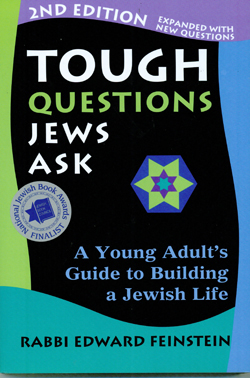 Tough Questions Jews Ask: A Young Adult’s Guide to Building a Jewish Life, 2nd Edition by Rabbi Edward Feinstein, Jewish Lights Publishing, 2012, 140 pages, ISBN 978-1-58023-454-2-51599, U.S. cover price: $15.99.
Tough Questions Jews Ask: A Young Adult’s Guide to Building a Jewish Life, 2nd Edition by Rabbi Edward Feinstein, Jewish Lights Publishing, 2012, 140 pages, ISBN 978-1-58023-454-2-51599, U.S. cover price: $15.99.
By Donald H. Harrison

SAN DIEGO–Some years ago I interviewed a spokesperson for the Home Instruction for the Parents of Pre-School Youngsters program (or HIPPY), which was developed in Israel and has since spread across the United States. I learned that parents who are deficient in their educations often may be too embarrassed to go back to school to learn, but they are willing to be taught how to teach their children.
In light of that conversation, I think that Rabbi Edward Feinstein, senior rabbi at Valley Beth Sholom in Encino, California, may have unnecessarily limited his audience when he gave his book Tough Questions Jews Ask the subtitle of “A Young Adult’s Guide to Building a Jewish Life.”
In fact, the questions that Feinstein tackles therein warrant serious attention from adults, even learned ones. But how many adults will be too embarrassed to read that which is earmarked for children? I’m not immune to such false pride; had I not been able to say “well, I’m reviewing this for San Diego Jewish World,” I might have been unwilling to carry this 140-page paperback around publicly.
Feinstein sets the discussion in a classroom of pre-teens who are studying to become Bar and Bat Mitzvah. He phrases the students’ questions in junior high school vernacular, such as “Do I Have to Go to Services? What Good Is Praying?”; “Is Any of That Stuff in the Bible True?”; “What is God Anyway?” and “Why Does Religion Need So Many Rules?” but his thoughtful, engaging answers are quite deep, certainly deep enough to hold a thinking adult’s interest.
God, Feinstein tells his students, is not an entity “separate from us and from the world, looking down on us.” Rather, “God is the All; God is everything. God is what connects everything to everything else, including us, the ones looking for God.” He suggests that we might imagine ourselves to be waves in the ocean. “Now suppose the wave became aware of itself. It might think it was a separate independent being. What would it take to make the wave discover that it was part of the ocean?”
Feinstein goes on to suggest that perhaps using nouns to describe God inhibits our grasping the concept of omnipreence. Suppose we made the word “God” a verb or an adverb? Perhaps, Feinstein offers, someone could be “God-ing” or “acting Godly?” In such an instance, “When we say that we feel close to God, we are saying that we are involved in God, participating in God, living Godly.”
A student’s question about why he can’t have a cheeseburger leads into a discussion of the reasons for the laws of kashrut. Feinstein points out that eating meat from animals presupposes that an animal had to be killed in order to become part of a meal. “Meat, which involves killing, symbolizes the taking of life. Milk, which nourishes newborns, symbolizes the giving of life,” Feinstein teaches. “The two must never be confused in our lives.”
I think that is a more powerful explanation than “well, in the old days, food could spoil and the rabbis didn’t want you to get sick” which I’ve heard parents tell their children. I think it’s also a pretty good ethical argument for not eating chicken and an egg together. Feinstein suggests “saying no to a cheeseburger is a way of saying no to a world that mixes up life and death, violence and fun .”
Are you interested in the rabbi’s other answers? You don’t have to go back to junior high school to read Feinstein’s book, no matter what its jacket may imply. My guess is that somewhere or another inside the book’s covers, you’ll find intriguing answers to questions that you’ve always wondered about.
*
Harrison is editor of San Diego Jewish World. He may be contacted at donald.harrison@sdjewishworld.com